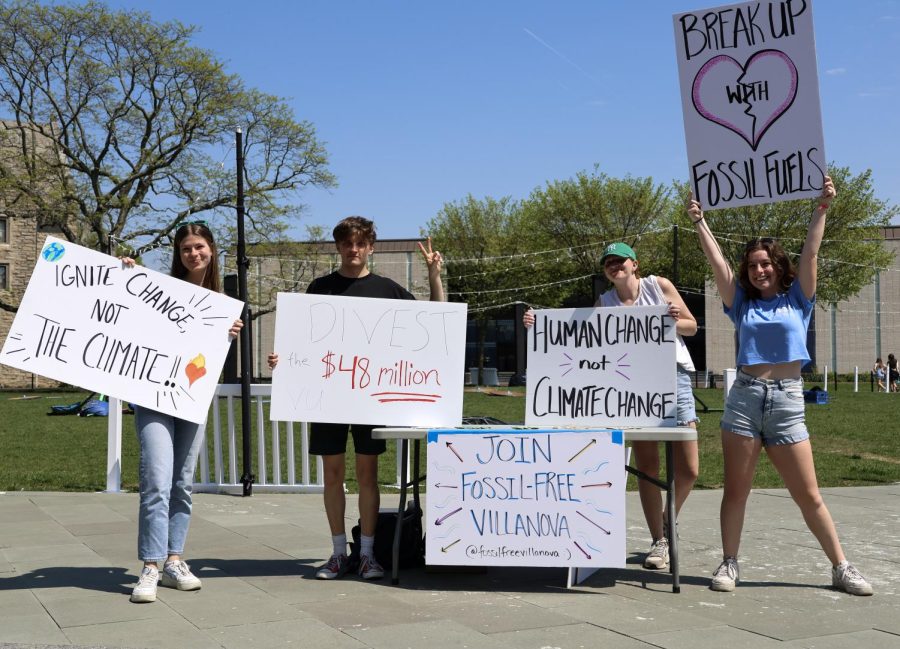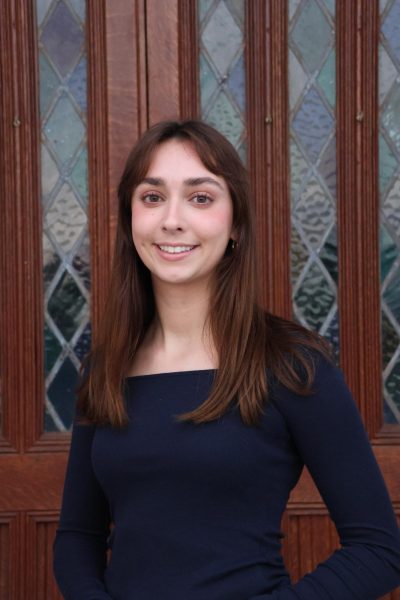Fossil Free Villanova Advocates for Eco-Conscious Investments
Graydon Paul/ Villanovan Photography
Fossil Free Villanova hosted a demonstration at the Oreo to advocate for the University to choose more eco-friendly investments.
April 26, 2023
Fossil fuels are the world’s leading source of global warming pollution due to excessive carbon dioxide emission. Villanova University divests itself from industries based on “morality vs. profitability.” The fossil fuel industry, however, is not found on this list, despite its’ overwhelmingly harmful impact. Villanova currently holds $48 million of its endowment to be “indirectly” invested in fossil fuels.
Fossil Free Villanova (FFV), a student-led campaign, aims to bring this issue to light and advocate for environmental justice through conversation with faculty. The administration’s response has sparked outrage from the student body, with groups like Fossil Free Villanova stepping up to campaign for a sustainable endowment plan and against the University’s harmful investment practices. A press release by FFV announced that, when questioned about their detrimental investments, the Villanova Investment Board of Trustees claimed that “it is not [its] responsibility to create a world in which we do not have to use fossil fuels in our day-to-day lives,” precisely because it believes that it should not be “expected to find sustainable alternatives to fossil fuels when the developing world isn’t.” This privileged and overall naive response to the climate issue implores the student body to educate and advise the administration on environmentally regenerative practices.
On April 21st, an on-campus climate demonstration broke out amidst the Friday afternoon heat with guest speakers, marching and witty signage. Students witnessed a cluster their peers parading through campus shouting chants, such as “Hey! Ho! Fossil fuels have got to go!” and “Who’s future? Our future!”
The group began at the Oreo, where Gabriella Slentz, a leader of the FFV campaign, vocalized her disappointment with the University’s “rose-tinted glasses.” Her passion for this issue brought out a crowd of students and supporters. Slentz and many others do not understand how “fossil fuel investments are not the same caliber as issues involving human life.” Fossil fuels and the subsequent impact on climate change do affect human life, which needs to be recognized.
As students marched, senior biology major Olivia Fedio spoke on how the administration is doing an injustice to its student body by turning away from issues that plague the campus. She recognized that creating a widespread impact can be difficult, suggesting one reason the administration might shy away from their responsibility.
“Championing the divest movement is something small [that can] have a much larger impact,” Olivia stated.
The University should be proud of the young activists it has created and, in turn, listen to the powerful words they have to say. Feddio noted that “knowledge is painful,” yet we can use this knowledge to our advantage to create real change.
FFV was joined by Fossil Free UPenn, an organization of similar origin campaigning for fossil fuel divestment on their campus. Member Megha Neelapu, a junior at University of Pennsylvania, called out established universities nationwide that seemingly have the funds to invest in projects without excessive use of fossil fuel technology. She expressed that these “universities have millions and billions of dollars with [the] ability to fix these problems,” yet they “take no action.” Issues like climate divestment can unite schools in the area that want to enact change for the good. Megha emphasized that universities “who want to continue to pitch themselves as global leaders” must do something for climate justice to stay that way.
The group moved towards Mendel Hall, where an Earth Quaker Action Team (EQAT) member spoke about advocating for a sustainable and just economy. EQAT campaign organizer, Lina Blount, spoke about the long fight that will ensue over climate justice. Blount stated that it is in our hands to “take on these big institutions” and do something about our future. She mentioned that Villanova has an advantage over other campuses because the University already places value-based filters on its investments. We must advocate for justice because divesting from the fossil fuel industry should share similar significance to other leading issues.
The last stop was the church, where those gathered heard from Cathy Nguyen, a senior majoring in theology and peace and justice. She desperately urged Villanova, as an Augustinian University, to follow its values and meet at the intersection of faith and justice. Nguyen commented on the administration’s “horrifying” response to the groups’ requests for divestment.
“This is not the Villanova that I have come to know and love,” she expressed.
The overall impact of this demonstration was positive between students and faculty alike.
A first-year student, Reetika Agarwal, joined the march.
“I was surprised to hear about [Villanova’s investment],” she said. “I hope that the protest, along with the other efforts of Fossil Free Villanova, encourage[s] Villanova to reevaluate their endowment.”
Stephanie Sena, an anti-poverty fellow at the Villanova Law School, instructed students, as a part of a social activism class, to create a campaign for which they are passionate. FFV was born from this project. Sena commented on the protest and a call to action for students to get involved.
“[We] need broad support… to leverage our privilege [and] fight for a better world for ourselves and future generations,” Sena said.
The Fossil Free Villanova group urges the student body to take action. Students can visit its Instagram @fossilfreevillanova and support it by copying and pasting the email link on its page and sending it to the Office of the President and the Board of Trustees.



